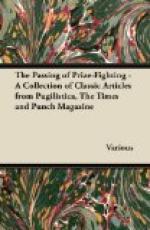When on the march the Battery arrives at the morass allotted to it for horse lines, I know that all will be well with the mud-bespattered Sapphira. Steggles leaps from the waggon whereon, in company with one of the cooks, he tours the pleasant land of France, and receives the mare. With his toes strangely pointed out, he leads her away from the scene of labour and language, disappearing amidst the hovels of the adjacent village. Often I never see him or obtain news of him till next morning, when he produces Sapphira polished like a silk hat and every scrap of metal about her sparkling. Occasionally I have tracked him to the shelter where he secretes and waits upon Sapphira, always to find that he has discovered and occupied the best stable in the village. The grooms of my brother-officers never learn that Steggles’ vacuous expression is the disguise of an intellect subtle, discriminating and alert, so they never trouble to endeavour to forestall him. To find Sapphira is to find Steggles, as he always likes to spread his blanket where she could tread on him if she wanted anything during the night.
From time to time he chooses the occasion of a night’s halt on the march to indulge in a bilious attack; but he has no other vice except an inveterate reluctance to leave off polishing my boots when I mount. No matter how Sapphira may prance and back and sidle, he follows her round and round with a remnant of a shirt, rubbing mud-spots off my boots in the stirrup. It is quite useless to bellow, “That will do, Steggles!”—his ideal is the unattainable perfection, and he persists. I have to escape by giving Sapphira the spur at the risk of knocking Steggles into the mud, or be late in turning out.
He never gives anything, even his own performances, unqualified praise; in fact it is extremely hard to win from him any encomium higher than “It’s not too bad.” Perhaps there is Scotch blood in his veins.
I very much want to recommend him for some decoration, but the organization likely to appreciate the most gallant of his deeds has not yet been formed—the S.P.G.P., or Society for the Preservation of Government Property.
Steggles was once riding behind me down a valley liberally dimpled with shell-holes, further dimples being in process of formation as we rode. I was returning from an O Pip, or Observation Post, and Steggles was carrying a pair of my boots with a rolled puttee stuffed into each. Suddenly I was aware that he had wheeled his horse about, and was trotting back towards the most dimply area of the valley. Out of regard for his family, I cantered after him. He broke into a gallop. When, after a thrilling ride, I caught him and had a little talk amongst the dimples, it appeared that he had dropped one of the puttees, and wished to return and look for it. This incident will, I think, demonstrate the exceptional character of the man, who did not appear to regard himself as a hero, or to pose as a desperate farceur, or to aspire to the post of Q.M.S., though, incredible as it may seem, the puttee in question was of the variety G.S.




